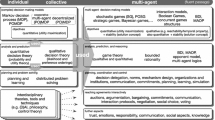Abstract
We consider a multiagent decision making problem where an agent, being able to estimate the preferences of other agents, defines its own in such a way that, after an aggregation process, its most desired alternative receives the highest group support. In previous work, this informed agent defined its preferences as the solution of a non-linear optimization problem. In this competitive scenario, and focusing on this agent, we analyze the amount of imprecision in the estimates that can be tolerated while still making its most preferred alternative the most supported one. We empirically show that, even when considering just the “harmful” errors in the estimates, the informed agent is able to force the group decision towards its interest.







Similar content being viewed by others
References
Arrow K (1952) Social choice and individual values. Wiley, New York
Beliakov G, Pradera A, Calvo T (2007) Aggregation functions: a guide for practitioners, volume 221 of studies in fuzziness and soft computing. Springer, Berlin
Calvo T, Mayor G, Mesiar R (2002) Aggregation operators: new trends and applications, volume 97 of studies in Fuzziness and soft computing. Springer, Berlin
Fro (2007) Premium solver platform, user guide, version 08. Frontline Systems Inc, Sydney
Kahraman C (ed) (2008) Fuzzy multi-criteria decision making theory and applications with recent developments, volume 16 of Springer optimization and its applications. Springer, Berlin
Kangas A, Lreskinen P, Kangas J (2007) Comparison of fuzzy and statistical approaches in multi-criteria decision making. For Sci 53:37–88
Kraus S (2001) Automated negotiation and decision making in multiagent environments. In: Luck M (ed) Lecture notes in artificial intelligence, vol 2086, pp 150–172
Madani K, Lund JR (2011) A monte-carlo game theoretic approach for multi-criteria decision making under uncertainty. Adv Water Resour 34(5):607–616
Pasi G, Yager RR (2006) Modeling the concept of majority opinion in group decision making. Inf Sci 176(4):390–414
Pelta D, Yager R (2010) Decision strategies in mediated multi-agents negotiations: an optimization approach. IEEE Trans SMC Part A 40(3):635–640
Torra V, Narukawa Y (2007) Modeling decisions: information fusion and aggregation operators. Springer, Berlin
Vanicek J, Vrana I, Aly S (2009) Fuzzy aggregation and averaging for group decision making: a generalization and survey. Knowl Based Syst 22(1):79–84
Yager R (2007) Multi-agent negotiation using linguistically expressed mediation rules. Group Decis Negot 16(1):1–23
Yager RR, Kacprzyk J, Beliakov G (eds) (2008) Recent developments in the ordered weighted averaging operators: theory and practice, volume 265 of studies in fuzziness and soft computing. Springer, Berlin
Acknowledgments
D. Pelta acknowledges support from projects TIN2011-27696-C02-01, Spanish Ministry of Economy and Competitiveness and P11-TIC-8001 from the Andalusian Government (including FEDER funds from the European Union). Ronald Yager’s contribution was in part supported by an ARO Multidisciplinary University Research Initiative (MURI) grant (Number W911NF-09-1-0392) and by the ONR grant for “Modeling Human Behavior with Fuzzy and Soft Computing Methods”, award number N00014-13-1-0626. The authors thanks the financial support of the Granada Excellence Network of Innovation Laboratories (GENIL), University of Granada (UGR), Campus of International Excellence BioTic-Granada.
Author information
Authors and Affiliations
Corresponding author
Rights and permissions
About this article
Cite this article
Pelta, D.A., Yager, R.R. Analyzing the Robustness of Decision Strategies in Multiagent Decision Making. Group Decis Negot 23, 1403–1416 (2014). https://doi.org/10.1007/s10726-013-9376-0
Published:
Issue Date:
DOI: https://doi.org/10.1007/s10726-013-9376-0




